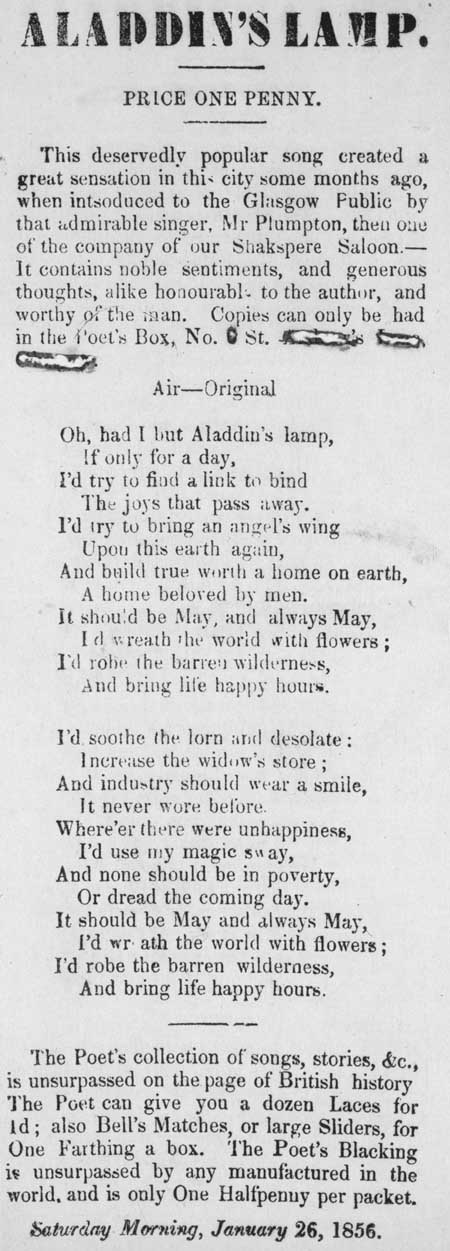Commentary
This ballad begins: 'Oh, had I but Aladdin's Lamp, / If only for a day, / I'd try to find a link to bind / The joys that pass away. / I'd try to bring an angel's wing / Upon this earth again, / And build true worth home on earth, / A home beloved by men.' A note below the title states that 'This deservedly popular song created a great sensation in this city some months ago, when intsoduced to the Glasgow public by that admirable singer, Mr Plumpton'. The sheet was published on the Saturday morning of January 26th, 1856, and was available for purchase from the Poet's Box. The writer of this whimsically altruistic ballad muses on what he would do to improve the world, if he had his own Aladdin's Lamp. The legend of Aladdin's Lamp is one of the most famous stories from the Tales of the Arabian Nights. In the original story, the lamp is rubbed and a genie suddenly emerges from the lamp to grant the lamp's owner three magic wishes. As the writer's stated objective is to end poverty through creating a utopia and brotherhood of man, it could be argued that this ballad is quite political in subject matter.
The Poet?s Box in Glasgow operated from 1849 to 1911. Matthew Leitch was the proprietor at 6 St. Andrew Lane?s, a narrow street on the south side of Gallowgate, from 1850 to 1858. His son William Munsie Leitch worked at the same address from 1859 to 1865 and at varous addresses in London Street until 1911. Many of the broadsides published by the Glasgow Poet?s Box were dated and some carried advertisements, not just for printed items but also for shoe blacking and ?soap for lovers?! Like the other ?boxes? in Dundee and Edinburgh, the Glasgow one sold love songs, sea shanties, parodies and dialogues. It is not clear what the connection between the different Poet?s Boxes were. They almost certainly sold each other?s sheets. It is known that John Sanderson in Edinburgh often wrote to the Leitches in Glasgow for songs and that later his brother Charles obtained copies of songs from the Dundee Poet?s Box. There was also a Poet?s Box in Belfast from 1846 to 1856 at the address of the printer James Moore, and one in Paisley in the early 1850s owned by William Anderson.
Early ballads were dramatic or humorous narrative songs derived from folk culture that predated printing. Originally perpetuated by word of mouth, many ballads survive because they were recorded on broadsides. Musical notation was rarely printed, as tunes were usually established favourites. The term 'ballad' eventually applied more broadly to any kind of topical or popular verse.
View Transcription | Download PDF Facsimile
|
 |
Date of publication:
1856 shelfmark: L.C.1269(177a)
 View larger image
View larger image
|


